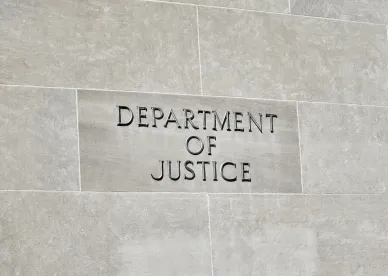The U.S. Department of Justice Antitrust Division (DOJ) and U.S. Federal Trade Commission (FTC) recently issued a joint statement on competitor collaborations intended to respond to the 2019 novel coronavirus (COVID-19) pandemic. That statement, among other things, commits to significantly expedite—from several months to just seven days—the DOJ’s Business Review Process and the FTC’s Advisory Opinion Process, which provide a means for businesses to submit a proposed collaboration to the agencies for advance approval.
Earlier this week, the DOJ issued its first Business Review Letter relating to a COVID-19 collaboration. That letter provides an early signal of the agencies’ commitment to the promised expedited review process, while also identifying factors that are significant to the agencies when analyzing COVID-19 partnerships.
THE PROPOSED COLLABORATION AND DOJ’S RESPONSE
On March 30, 2020, a group of major pharmaceutical distributors, a health care logistics provider and a medical supply manufacturer submitted an urgent Request for Business Review Letter to the DOJ relating to a proposed collaboration to “expedite and increase manufacturing, sourcing, and distribution of personal-protective equipment (‘PPE’) – including masks, gowns, gloves, and other equipment intended to help protect first responders and other members of the medical community against Coronavirus-related infection, as well as medication to treat COVID-19 patients.” The collaborators intended to work together and with the U.S. Federal Emergency Management Agency (FEMA) and the U.S. Department of Health and Human Services (HHS) to help with supply and distribution of personal protective equipment, as well as with understanding and negotiating competitive prices for medical supplies. On April 4, 2020, the DOJ issued its response, indicating that, based on the information provided, it does not plan to challenge the collaboration.
Both the request and the response placed significant emphasis on press reports and government orders relating to the exceptional circumstances of the COVID-19 crisis and the challenges it presents, including shortages of personal protective equipment and laboratory supplies. The request, for example, cited U.S. President Donald Trump’s invocation of both the Defense Production Act and the Pandemic and All-Hazards Preparedness Act, as well as a World Health Organization report outlining the “severe and mounting disruption to the global supply of PPE.” In turn, the response addressed in detail domestic and international emergency declarations in response to COVID-19, as well as statistics regarding the pandemic’s spread and the rapid increase in documented COVID-19 cases and deaths in the U.S.
The DOJ agreed that “[a]ddressing potential disruptions to global PPE supply is central to the U.S. Government’s effort to save American lives and livelihoods from the destructive effects of COVID-19.” The DOJ also found that the collaboration was tailored to “facilitating the U.S. Government’s efforts to respond to the unprecedented COVID-19 pandemic, including by guiding PPE and medications to the places where they are needed most.” The DOJ further emphasized that the requesting parties had agreed to several safeguards to protect against potentially anticompetitive outcomes, including:
- Limiting the collaboration to conduct intended to further U.S. government policy and efforts
- Refraining from using the collaboration to increase prices, reduce output or engage in COVID-19 profiteering
- Making all reasonable efforts to limit sharing of competitively sensitive information among the collaborators
- Formally dissolving the collaboration upon resolution of COVID-19-related disruptions and related U.S. response initiatives
Although the DOJ’s decision not to challenge the collaboration was based in part on the fact that the collaborative activity was at the direction of federal agencies, which is generally immune from antitrust scrutiny, the DOJ recognized that certain aspects of the collaboration may take place outside of such agencies’ presence or beyond the scope of such agencies’ direction. Because the requesting parties indicated that such conduct would be limited and not involve discussions of competitively sensitive information, the DOJ concluded that these activities should be judged by the rule of reason, requiring balancing of procompetitive benefits and any anticompetitive effects.
In this regard, the DOJ observed that its longstanding guidance that “a competitor collaboration may enable participants to offer goods or services that are… brought to market faster than would be possible absent the collaboration” and “may allow its participants to better use existing assets.” The DOJ identified a number of potential consumer benefits from the partnership under review, such as enabling the collaborators “to bring life-saving goods faster to market than would be possible absent the collaboration” and “enhanc[ing] the supply chain of these products in the midst of the nationwide pandemic.”
Because the proposed collaboration was intended to address COVID-19-related scarcity, will bring critical medical supplies to communities in need, supports U.S. government agencies’ objectives, is limited in scope and duration, and is subject to several safeguards to prevent anticompetitive harm, the DOJ determined it would not challenge the collaboration. However, the DOJ did not provide carte blanche approval for COVID-19-related collaborations, specifically warning against collaborations that engage in price-fixing or other prohibited conduct, as well as against exchanging sensitive forward-looking competitive information.
TAKEAWAYS AND TIPS
The April 4, 2020, Business Review Letter provides the first and, at least for now, only analysis by the U.S. antitrust agencies of a COVID-19 competitor collaboration. The letter underscores the following points for businesses considering collaborating with competitors to address pandemic-related challenges, particularly in the near-term:
- In this initial response, the DOJ followed through on its promise to greatly expedite requests for Business Review Letters, issuing the letter in only five calendar days. Although the crisis is fast-evolving and businesses may be reluctant to wait for agency review before implementing a proposed collaboration, the prompt turnaround is an encouraging sign. Such brief delays prior to implementation of a collaboration may be particularly justifiable for collaborations that would be considered higher-risk under U.S. antitrust law, but for the COVID-19 crisis.
- Businesses submitting requests for DOJ Business Review Letters or FTC Advisory Opinions should, to the extent possible, refer to press reports and government orders supporting the objective of the collaboration.
- Requests to DOJ and FTC also should identify in detail all safeguards that will be taken to limit unnecessary sharing of competitively sensitive information and, if possible, include a representation that the collaboration will not be used to raise prices, reduce output, reduce quality or engage in COVID-19 profiteering.
- Requests also should identify limitations on the timing and scope of the collaboration to establish that the collaboration will continue only to the extent necessary to address the relevant COVID-19-related challenge.
- Collaborations operating under the direction of U.S. government agencies to address the COVID-19 crisis have particular leeway under U.S. antitrust law, but are not necessarily wholly immune from scrutiny. Collaborators still should implement safeguards against anticompetitive outcomes and narrowly tailor the collaboration to the needs of the pandemic.
- The agencies intend to challenge anticompetitive collaborations. The April 4, 2020, Business Review Letter confirms that DOJ “would be concerned” with unlawful price fixing, the direct exchange of sensitive forward-looking competitive information or other anticompetitive harm.
- Companies generally should consult with antitrust counsel before embarking on collaborations intended to address the COVID-19 crisis or submitting a request for a Business Review Letter or FTC Advisory Opinion.





 />i
/>i

